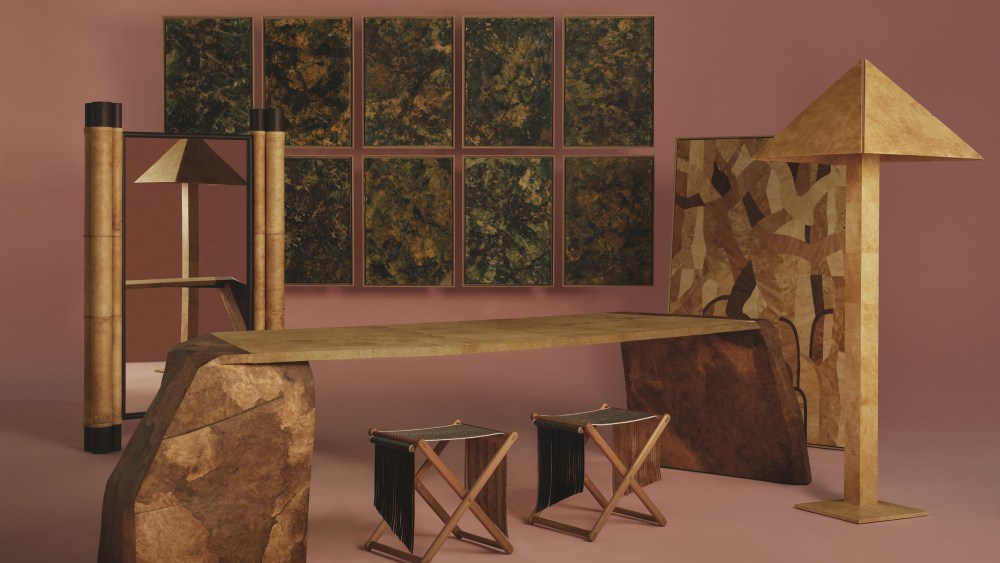MILAN — Just over a year after Mycoworks’ Reishi, a new material grown from mycelium, debuted its first full fashion look at the Buro Stedelijk museum space in Amsterdam, it’s ready to take on the world of interiors. The first furniture pieces covered in Reishi are being made by the French family-run firm Ligne Roset and will hit the market in 2025, the California-based company told WWD.
“We are so ready to enter that world. We are already here. For interior design, there are so many possibilities and we’re working with architects on private mansions and hotels as we speak,” said the firm’s senior vice president of sales Frederick Martel.
Mycoworks has been working with Ligne Roset, which was founded in 1860, for the past five years. Martel added that the collaboration has tested Reishi’s performance on an industrial level to understand if it will one day be able to meet market demands. Among those tests was putting 220 pounds in weight on top of a chair cushion made of Reishi and repeating that test 20,000 times.
Other collaborations have followed, in Europe and North America, Martel said, declining to mention names.
In 2021, Mycoworks rose to the international fore after it covered Hermès’ Victoria shopper bag with its high-end mycelium leather.
Over the past year, the biotechnology company founded in 2013 by artists Phil Ross and Sophia Wang has been actively pushing Reishi into the broader design world and is gearing up to see Reishi-covered furniture sold on the wider market.
During Design Miami Paris in October, Mycoworks enlisted seven French designers and artists to create seven products including folding screens, desks and lighting fixtures out of Reishi. At the Alcova space during Design Miami, Stockholm’s Studio Tooj introduced the Duk side table made with Reishi using cutting-edge craftsmanship. At the carbon-positive Populus hotel in Denver, 700 sheets of Reishi were used to construct a dramatic tapestry as its main centerpiece.

Duk made of Reishi for Mycoworks
Courtesy of MycoWorks
Reishi is made of mycelium, which is the root structure of mushrooms. It is first grown in a sheet before it is harvested and finished into a soft material in Spain.
Mycoworks, which is based in Emeryville, Calif., on the eastern edge of San Francisco Bay and to the north of Silicon Valley, is also amping up its industrial capacity. Last year it cut the ribbon on its first commercial-scale Fine Mycelium production plant in South Carolina. Spanning 136,000 square feet, the factory is equipped to employ more than 350 people, which was envisioned to facilitate an influx of orders estimated at “millions of square feet of Reishi per year,” the company said at the time.
“This is the moment the luxury industry has been waiting for; a plastic-free, leather-like material that offers undeniable beauty and performance — at scale,” said Patrick Thomas, former chief executive officer of Hermès who now serves as a Mycoworks board member. “Now that the challenge of supply has been solved, brands will move quickly to commercialize items made with Reishi,” he said at the time.
Mycoworks’ proprietary Fine Mycelium production process cultivates mycelium in a controlled environment, harnessing its natural growth to create smooth sheets of Reishi, it contends, that meet the luxury industry’s performance standards. One of Reishi’s major selling points is that it is easily made in perfect geometric rectangles and therefore more efficiently cut without waste, versus the 40 to 70 percent estimated for leather production, according to Martel.
Since Reishi’s introduction the company has partnered with major brands across the luxury, fashion, home furnishings and automotive industries. In addition to Hermès and Ligne Roset, it has collaborated with General Motors. The latter has been a partner for several years and is emblematic of Mycoworks’ endeavors in the auto industry. Last July, Reishi was used for the interiors of the electric concept car Sollei, unveiled by Cadillac.

Mycoworks cofounder Sophia Wang
Courtesy of MycoWorks
The company has a diverse roster of investors that includes family-run businesses, venture capital firms, Decarbonization Partners, which is a Blackrock joint venture with Singapore firm Temasek, and VIPs like Natalie Portman.
In July 2022, Mycoworks revealed $125 million in Series C financing, with a pool of investors that included Prime Movers Lab, SK Networks, Mirabaud Lifestyle Impact and Innovation Fund, in addition to other new and existing investors with track records in the biotech space.
Across the board, alternative material firms have been a target by venture capital businesses and fashion firms alike.
In 2019, Chanel acquired a minority stake in green chemistry company Evolved by Nature, as part of its strategy of developing sustainable materials.
Formerly known as Silk Inc., the Boston-based firm focuses on designing and developing biomaterials-based products for industries ranging from personal care to textiles and medical devices. Its Activated Silk technology, consisting of natural silk in liquid form, provides a nontoxic alternative to chemicals in products.

Sheets of Reishi adorn the Pasque Bar of the Populus Hotel in Colorado.
Yoshihiro Makino

